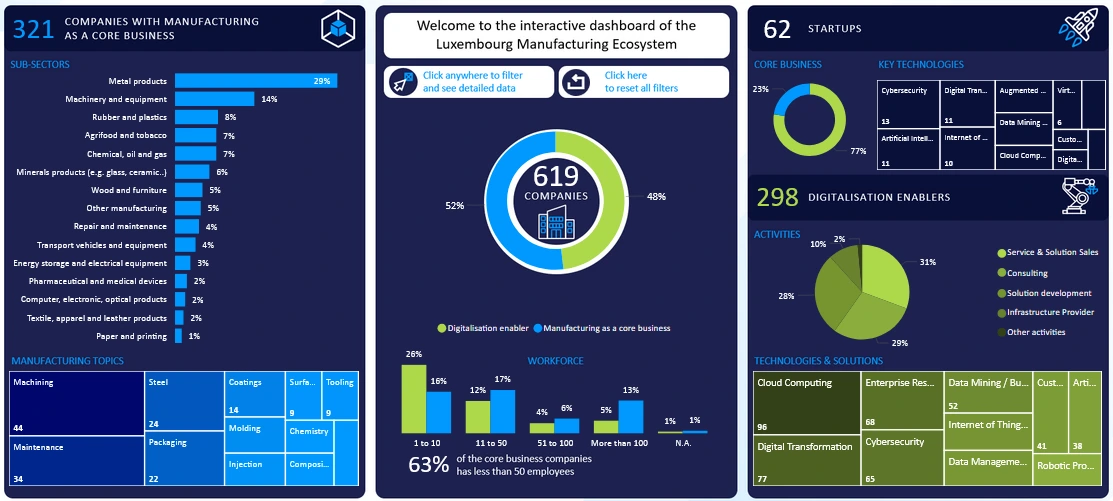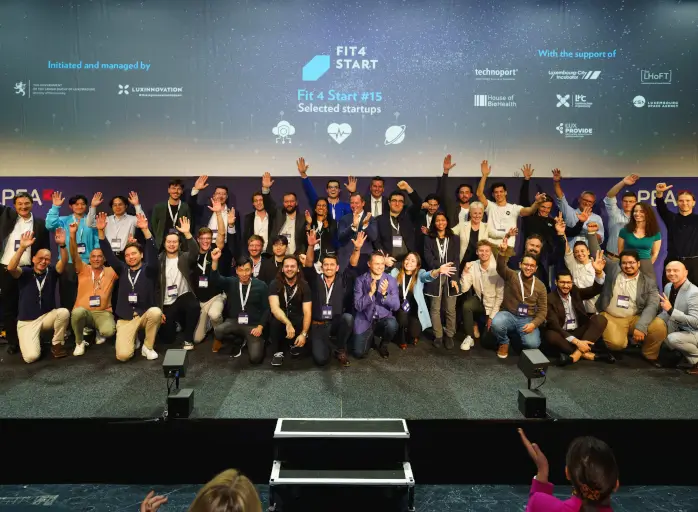

New manufacturing ecosystem mapping
The new analysis of the Luxembourg manufacturing ecosystem provides key insights into topics such as company size and age, location and specialisation.
 Lena Mårtensson
Lena Mårtensson
Providing in-depth and relevant knowledge about Luxembourg companies and economic ecosystems is part of Luxinnovation's missions. Following its first analysis of the composition of the country’s manufacturing ecosystem in 2021, the agency has just published a new version providing fresh insights into this key component of the national economy.
A stable ecosystem
The manufacturing ecosystem mapping – conducted with funding from the Luxembourg Digital Innovation Hub (L-DIH) – covers a total of 619 companies. 52% are businesses that have manufacturing as their core business, while the remaining 48% are digitalisation enablers providing products, services or solutions that facilitate the digitalisation of manufacturing activities.
The total number of companies is lower than in 2021, but Mohamed Toumi, Senior Market Intelligence Analyst at Luxinnovation who carried out the mapping together with his colleagues Giordano Viola, Caroline Muller and Nicolas Sanitas, is quick to point out that this does not mean that the sector has decreased in size over the past three years. “25 core manufacturing companies that were included in 2021 have since been dissolved, but we have identified 38 new ones, of which 2 were incorporated after 2021, and the number of digitalisation enablers remains unchanged,” he explains.
The difference in the total number is due to the stricter selection criteria for core manufacturing entities that were applied this time. “We excluded some companies whose activities were found to be closer to craftmanship than manufacturing, and also removed some entities that lack substantial activities in Luxembourg.”
Manufacturing insights
Luxinnovation’s study shows that most core manufacturing entities in Luxembourg are SMEs. Two-thirds employ less than 50 people. 18 firms have more than 500 employees. Geographically, the sector is concentrated in the south-west corner of the country. “63% of manufacturing companies are located in an area stretching from Luxembourg City to Capellen and Esch-sur-Alzette,” comments Caroline Muller, Materials & Manufacturing Cluster Manager at Luxinnovation. “However, the industry is also present in the north of the country with more than 100 businesses located north of Luxembourg City.”
63% of manufacturing companies are located in an area stretching from Luxembourg City to Capellen and Esch-sur-Alzette.
Caroline Muller, Luxinnovation
Almost one-third of the 321 core manufacturing companies are active in the metal product sub-sector, reflecting the industrial specialisation of the country. “These companies are in particular working with machining, steel and maintenance,” says Ms Muller. Other important sub-sectors include machinery and equipment, rubber and plastics, agrifood and tobacco, and chemicals, oil and gas.
Facilitating the digital transformation of manufacturing
Digitalisation is crucial for manufacturing companies to remain competitive. The mapping includes 298 digitalisation enablers that are essential for driving innovation towards smart manufacturing. 37% of them provide consulting and assessment services enabling companies to implement more innovative and digital manufacturing processes. Another 35% provide digital solutions making industrial operations and other business functions more digitalised and data-driven.
Luxinnovation has qualified the digitalisation enablers by the technologies they offer to core manufacturing companies, highlighting their diversified expertise. “The most commonly offered technology is cloud computing. There are also many enablers offering digital transformation services such as software development, IT infrastructure, automation and data analytics,” explains Mr Sanitas, Senior Advisor and Digital Community Coordinator at Luxinnovation.
Companies that are not yet sure of exactly what type of digital solutions they need can benefit from our digital maturity assessment.
Nicolas Sanitas, Luxinnovation
He highlights the importance of the enablers for the digital transformation of Luxembourg’s manufacturing sector. “They provide essential technologies and skills that complement what the core manufacturing companies have in-house and can considerably speed up the transformation process.”
To help companies find the digital enablers that they need, the Luxembourg Digital Innovation Hub (L-DIH) team has set up a Digital Innovation Hub Marketplace offering a single, easy access to enablers – both private companies and research organisations – that provide services facilitating the transformation towards industry 4.0.
“Companies that are not yet sure of exactly what type of digital solutions they need can benefit from our digital maturity assessment,” says Mr Sanitas. “Through the assessment, we help them identify their needs and provide suggestions regarding what type of service provider would be most relevant. We can also facilitate their contacts with the right digital players.”







